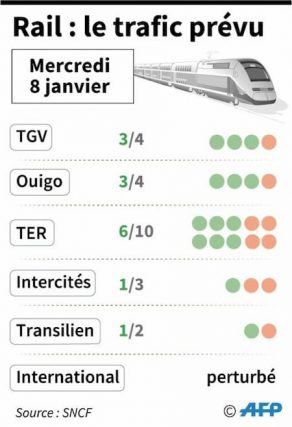Before a fourth big day of demonstrations against pension reform on Thursday 9th January 2020, the government tries to find a way out, in particular with the reformist unions.
The mobilization against the pension reform started more than a month ago continues on Wednesday 8th January 2020, before a fourth big day of demonstrations on Thursday. The government is showing its willingness to find a way out at the weekend, at least with the reformist unions.
The circulation of trains and public transport in Paris must still be very disrupted on Wednesday, the 35th consecutive day of the strike, as well as fuel shipments to French refineries or even court hearings.
Read also: Pension reform: the Donges refinery draws the strike before the day of January 9
8 #raffineries sur 8 en #greve aujourd’hui à la nuance près que celle de Gravenchon continue à distribuer du produit, mais enclenche des baisses de débits de production. Le terminal pétrolier du Havre et le grand dépôt de Fos-sur-Mer fermés pour 96h. #greve7janvier #petrole #CGT pic.twitter.com/4jIEiqnoDi
— Thierry Defresne (@ThierryDefresne) 7 January 2020
Halfway through a busy week between negotiations and demonstrations, weapons are sharpening in both camps.
System funding conference
On the executive side, a step towards a compromise seems to have been taken on the crucial question of the pivotal age, which had pointed the first French union, the CFDT, yet favorable to a universal system of pensions by points.
Prime Minister Édouard Philippe accepted the proposal of his number 1, Laurent Berger, to convene a conference to finance the system. He invited the social partners to Matignon on Friday to talk about the “mandate of this conference” and the “deadline which will be granted to him to succeed or (to) reach consensus solutions”.
But the tension has not completely subsided: Mr. Berger, like Laurent Escure, his counterpart at Unsa, have given the government until Friday to withdraw from its bill the establishment of a pivotal age at 64 years, below which it will no longer be possible to leave with a full rate retirement.
|| COMMUNIQUE DE PRESSE || La @CFDT note positivement l’ouverture du Premier Ministre ce jour mais appelle l’ensemble de ses adherents et ses militants à maintenir la pression sur le gouvernement pour le retrait de l’age pivot, mesure injuste et inutilehttps://t.co/wGXddeO1wy pic.twitter.com/SokqdFR2QT
— CFDT (@CFDT) 7 January 2020
” Who are we laughing at ? “
Time for the government to test the forces involved, Thursday in the street. The inter-union CGT-FO-Solidaires-CFE-CGC-FSU will demand the outright withdrawal of the project, after more than a month of mobilization and already three days of interprofessional actions, on December 5, 10 and 17.
Because if the strikers start to feel tired, the unions hostile to the reform do not intend to raise their guard.
“Propose a conference of funders (…), it has a little taste of ‘2019 return’, we are redoing the unemployment insurance reform”, where the government had decided on binding measures for the unemployed based on the persistent disagreement between unions and employers, estimated Tuesday Catherine Perret, number 2 of the CGT.
THIERRY DEFRESNE Délégué central de la CGT TOTAL : “Cet appel à la grève est une montée en puissance, un véritable succès. On veut montrer la détermination des salariés du pétrole.” #greveraffineries #reformedesretraites https://t.co/xY4C1mpYzz
— infos non stop (@ActusNonStop) 7 January 2020
” Who are we laughing at ? “, She added,” the string is too big for it to defuse the massive mobilization that will take place next Thursday and Saturday across the country “.
“The more people will be mobilized (Thursday), the more we will be heard quickly,” confirmed the secretary general of FO Yves Veyrier on RFI.
Meetings
Tuesday, the reform schedule was announced: presentation of the bill, currently in the hands of the Council of State, on January 24 in the Council of Ministers, then examination by the National Assembly from February 17 for adoption before summer.
A calendar of meetings has also been proposed to trade union organizations on various subjects – hardship, progressive retirement, employment of seniors, minimum pension, etc. – in the public and in the private sector.
A meeting devoted to the arduousness and for ends of careers in the public service must be held Wednesday morning in Bercy, boycotted by FO and Solidaires. The CFDT and CFE-CGC will also be received at the Ministry of Labor on the subject of arduous work at 11:00 a.m. and 2:00 p.m. The new M. Retraites of the government, Laurent Pietraszewski, receives for his part the CFE-CGC on the question notably of the minimum retirement pension.
700 million euros loss to SNCF
SNCF plans on Wednesday to run 75% of its TGVs, half of the Transiliens (RER SNCF, trains in the Paris suburbs), six TER out of ten, an increase of “20% compared to last week”, and one third of the Intercités.
The CEO of the railway company Jean-Pierre Farandou ruled on Tuesday the situation “serious and worrying” and assured that the SNCF was facing “more than 700 million euros of economic impact”.
On the RATP side, no metro line will be completely closed, but 14 out of 16 will be “very disrupted”, open totally or partially, but never all day. Some stations will be closed. RER A and B traffic will again be “very disrupted”.





